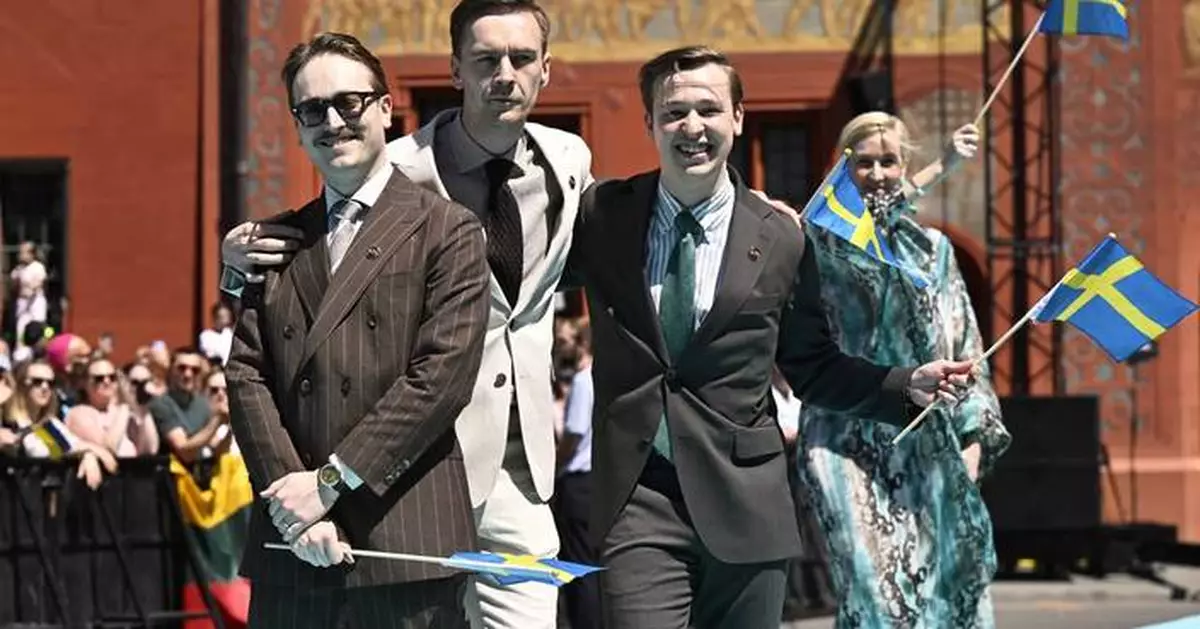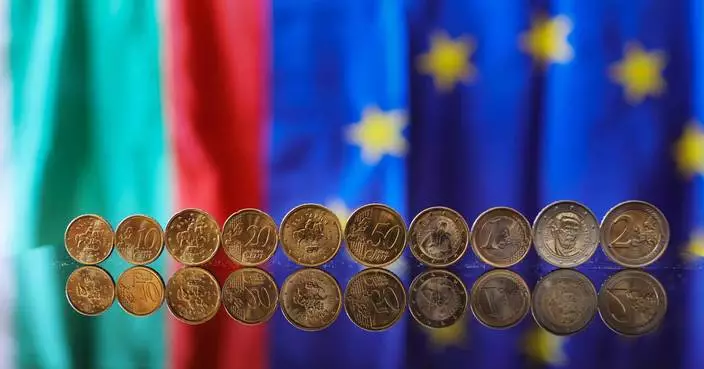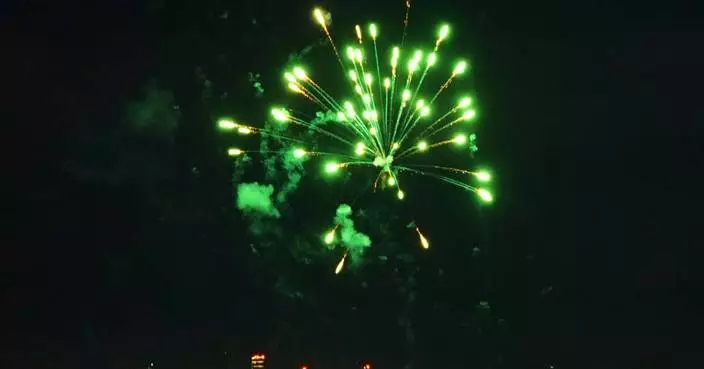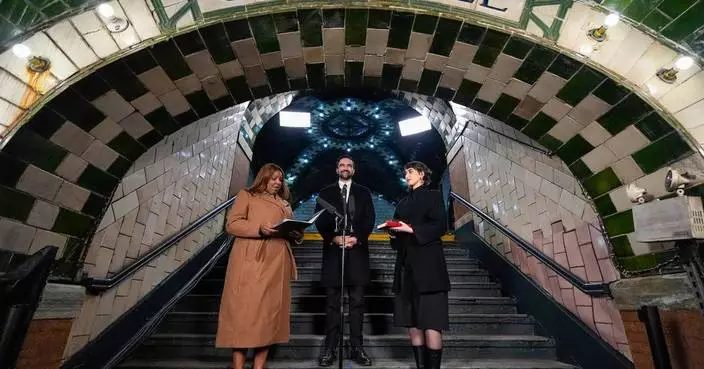LONDON (AP) — The Eurovision party is officially underway: a week of power pop, outrageous outfits — and, inevitably, protests — that culminates in the final of the 69th Eurovision Song Contest on Saturday night.
Competitors representing 37 countries are in the Swiss city of Basel for disco diplomacy and one of the world’s biggest spectacles. Organizers say last year’s final was watched by more than 160 million people — a guilty pleasure for some, an unabashed joy for others.
Click to Gallery
Marko Bosnjak from Croatia performs the song "Poison Cake" during the dress rehearsal for the first semi-final of the 69th Eurovision Song Contest, in Basel, Switzerland, Monday, May 12, 2025. (AP Photo/Martin Meissner)
Theo Evan from Cyprus performs the song "Shh" during the dress rehearsal for the first semi-final of the 69th Eurovision Song Contest, in Basel, Switzerland, Monday, May 12, 2025. (AP Photo/Martin Meissner)
Gabry Ponte from San Marino performs the song "Tutta L'Italia" during the dress rehearsal for the first semi-final of the 69th Eurovision Song Contest, in Basel, Switzerland, Monday, May 12, 2025. (AP Photo/Martin Meissner)
Kyle Alessandro from Norway performs the song 'Lighter' during the dress rehearsal for the first semi-final of the 69th Eurovision Song Contest, in Basel, Switzerland, Monday, May 12, 2025. (AP Photo/Martin Meissner)
Red Sebastian from Belgium performs the song "Strobe Lights" during the dress rehearsal for the first semi-final of the 69th Eurovision Song Contest, in Basel, Switzerland, Monday, May 12, 2025. (AP Photo/Martin Meissner)
Netherlands' Claude poses for a photo, during the opening ceremony of the 69th Eurovision Song Contest, in Basel, Switzerland, Sunday, May 11, 2025. (Peter Schneider/Keystone via AP)
Austria's JJ poses for a photo, during the opening ceremony of the 69th Eurovision Song Contest, in Basel, Switzerland, Sunday, May 11, 2025. (Peter Schneider/Keystone via AP)
Israel's Yuval Raphael poses for a photo, during the opening ceremony of the 69th Eurovision Song Contest, in Basel, Switzerland, Sunday, May 11, 2025. (Peter Schneider/Keystone via AP)
Pro Palestinian protesters demonstrate, during the opening ceremony of the 69th Eurovision Song Contest, in Basel, Switzerland, Sunday, May 11, 2025. Sign read, '11th Commandment: Israel is allowed to do everything.' (Georgios Kefalas/Keystone via AP)
Sweden's KAJ pose for a photo, during the opening ceremony of the 69th Eurovision Song Contest, in Basel, Switzerland, Sunday, May 11, 2025. (Peter Schneider/Keystone via AP)
Here’s how and what to watch:
This year’s contest is in Switzerland because Swiss singer Nemo won the contest last year with the operatic anthem “The Code.” Basel, which borders Germany and France, was chosen as the host city.
Countries from across Europe — and a few beyond, like Israel and Australia — have sent an act to Eurovision. The performers will take the stage at St. Jakobshalle arena in semifinals on Tuesday and Thursday that will choose 20 acts to go through to the final.
The “Big Five” of France, Germany, Italy, Spain and the U.K., along with host Switzerland, automatically qualify for the final.
The competition will be aired by national broadcasters in participating nations, on streaming service Peacock in the United States and in many countries on the Eurovision YouTube channel.
Bars and clubs in many European cities will show the final at parties.
Halfdan Helgi Matthiasson, representing Iceland as half of sibling duo VAEB, said his family watches the classic, way, “sitting on a sofa with popcorn and snacks.”
Croatian contestant Marko Bošnjak said he was usually “the person who was hosting the Eurovision parties and forcing everybody to give me their scores and papers," adding: “It’s my Olympics. I live for this.”
Adonxs, this year’s competitor from Czechia, has fond memories of working in a London pub where staff were body-painted in the colors of a national flag.
“I did get an allergic reaction on my face the next morning, which I did not appreciate,” he said. “But yeah, I guess it was worth it.”
During and immediately after the semifinals and final, viewers in participating countries can vote by phone, text message or the Eurovision app — but not for their own country. Viewers in the U.S. and other nonparticipating countries can vote online at www.esc.vote or with the app. The combined “rest of the world” vote is given the weight of one individual country.
The semifinals are decided by public vote, and viewers can only vote in the semifinal their country is participating in.
For the final, the winner is decided by a complex mix of public voting and points from juries of music industry professionals in all the participating countries. The juries allocate between one and 12 points to their favorite songs, with an announcer from each country popping up to declare which has been granted the coveted “douze points” (12 points).
Public and jury votes are combined to give each country a single score. Ending up with “nul points” (zero points) is considered a national embarrassment.
Betting odds make Sweden the strong favorite with “Bara Bada Bastu,” an upbeat ode to sauna culture performed by the trio KAJ.
Favorites have tended to win in recent years, but that isn’t always the case.
Other strong contenders, according to bookmakers, include classically trained Austrian singer JJ’s “popera” song “Wasted Love,” French singer Louane’s ballad “maman,” Dutch entry Claude’s “C’est La Vie” and Israeli singer Yuval Raphael, a survivor of Hamas’ Oct. 7, 2023 attack, with “New Day Will Rise.”
Israel has competed in Eurovision for more than 50 years, and won four times. But last year’s event in the Swedish city of Malmo drew large demonstrations calling for Israel to be kicked out of the contest over its conduct of its war against Hamas in Gaza.
More than 70 former participants, including 2017 winner Salvador Sobral from Portugal, 2023 U.K. entry Mae Muller and La Zarra, who competed for France in 2023, signed a letter calling for Israel to be excluded. They noted that Russia has been banned since its 2022 invasion of Ukraine.
The European Broadcasting Union, which runs Eurovision, pointed out that Israel is represented by its public broadcaster, KAN, not the government.
Several of the national broadcasters that fund Eurovision, including those of Spain, Ireland and Iceland, have called for a discussion about Israel’s participation.
After tensions ran high last year, with the expulsion of the Dutch contestant over a backstage altercation, the EBU tightened the contest’s code of conduct, calling on participants to respect Eurovision’s values of “universality, diversity, equality and inclusivity” and its political neutrality.
It has barred performers from waving flags, other than national ones, onstage or in other on-camera areas. But some delegations have protested that effectively bans LGBTQ+ pride flags from an event with a huge gay following.
Audience members will be allowed more leeway, however, after controversy last year after a ban on Palestinian flags.
Associated Press journalists Hilary Fox and Kwiyeon Ha contributed to this story.
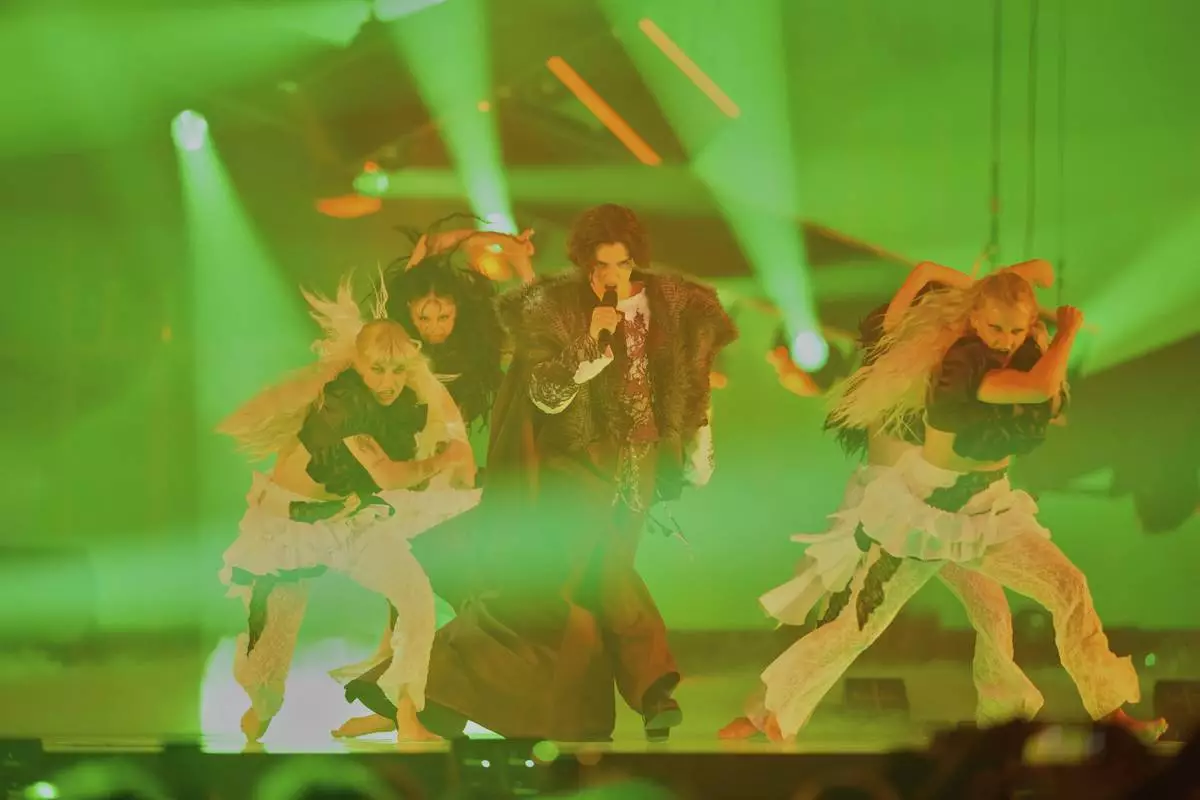
Marko Bosnjak from Croatia performs the song "Poison Cake" during the dress rehearsal for the first semi-final of the 69th Eurovision Song Contest, in Basel, Switzerland, Monday, May 12, 2025. (AP Photo/Martin Meissner)
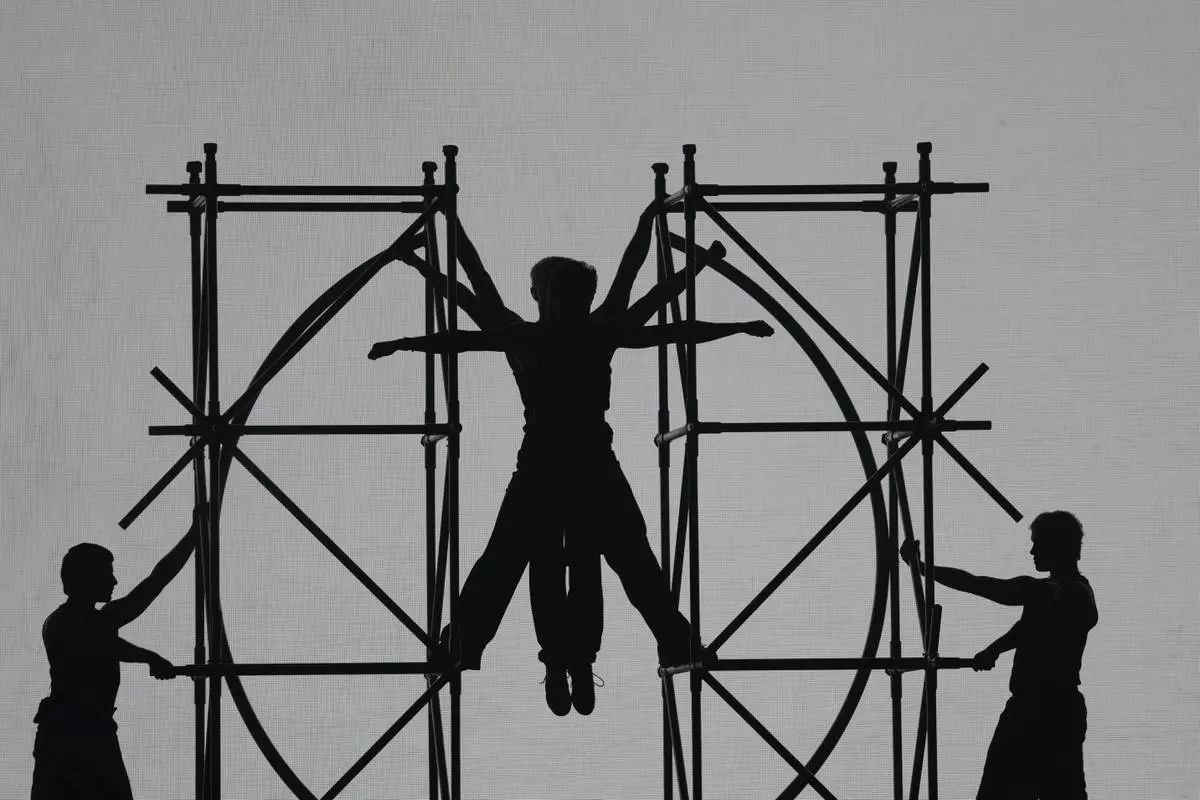
Theo Evan from Cyprus performs the song "Shh" during the dress rehearsal for the first semi-final of the 69th Eurovision Song Contest, in Basel, Switzerland, Monday, May 12, 2025. (AP Photo/Martin Meissner)
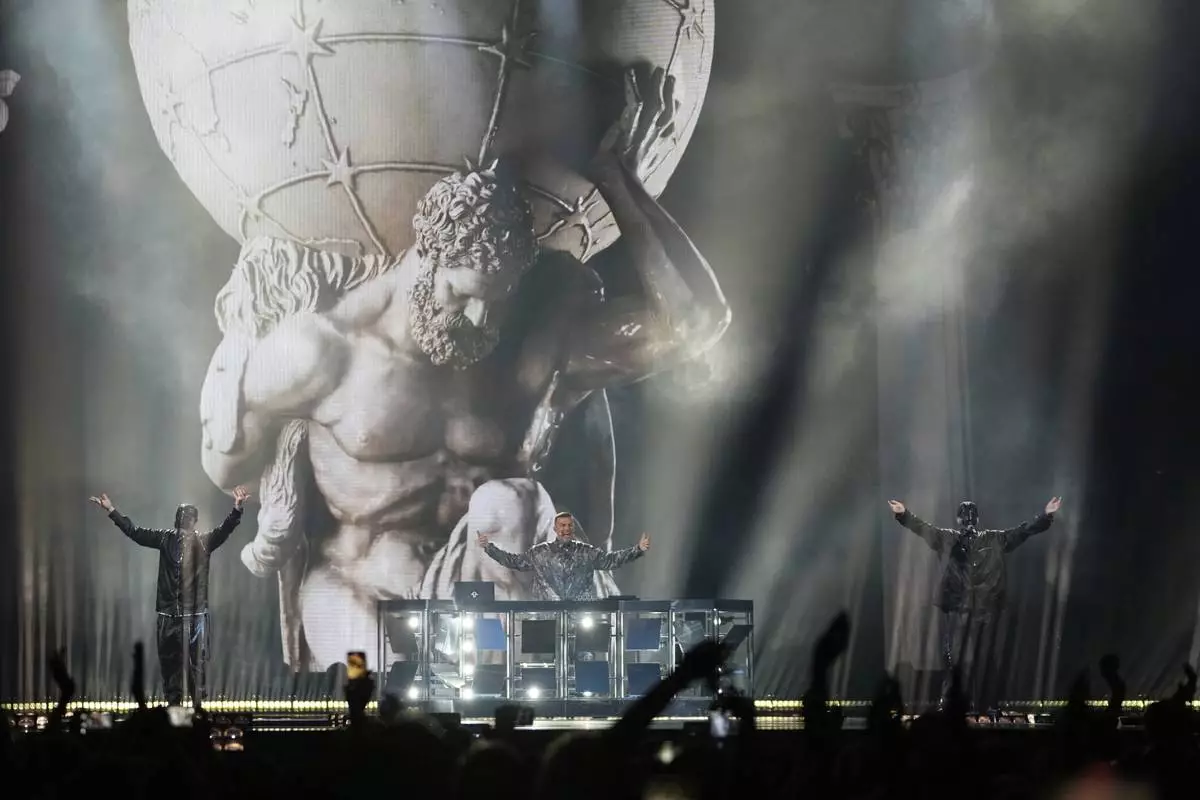
Gabry Ponte from San Marino performs the song "Tutta L'Italia" during the dress rehearsal for the first semi-final of the 69th Eurovision Song Contest, in Basel, Switzerland, Monday, May 12, 2025. (AP Photo/Martin Meissner)

Kyle Alessandro from Norway performs the song 'Lighter' during the dress rehearsal for the first semi-final of the 69th Eurovision Song Contest, in Basel, Switzerland, Monday, May 12, 2025. (AP Photo/Martin Meissner)
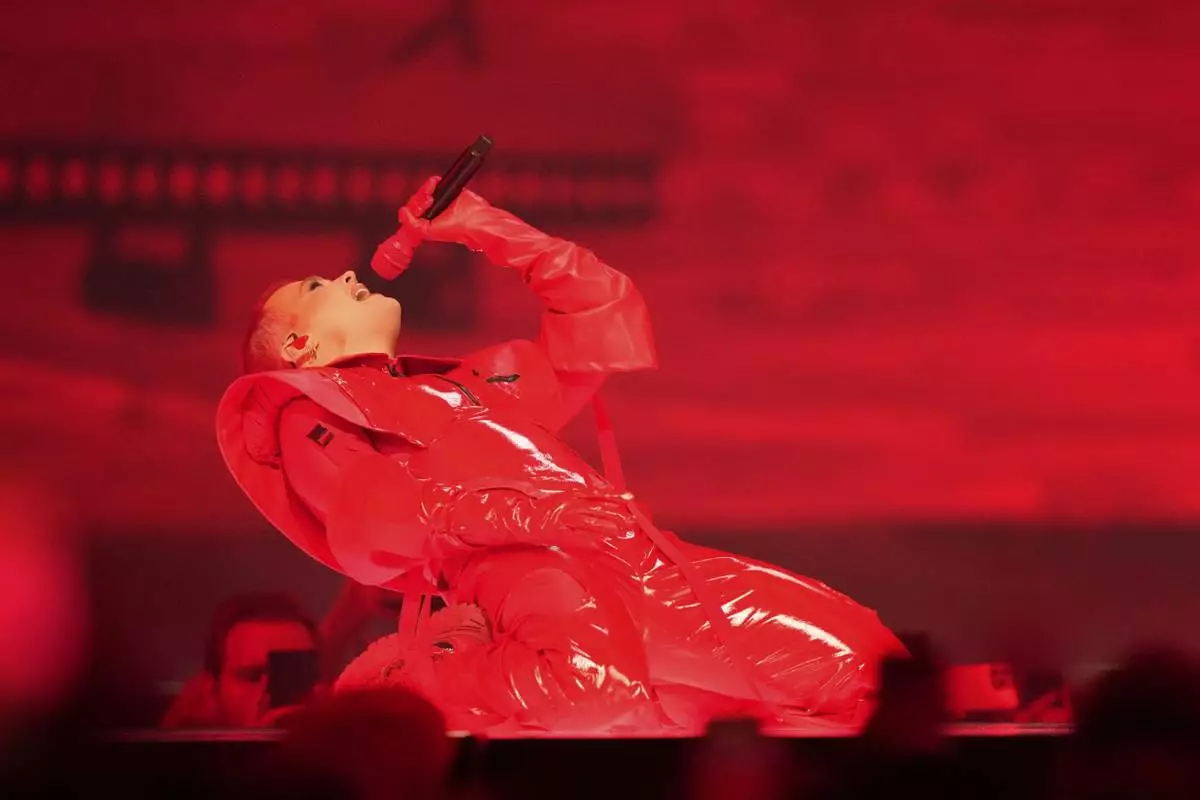
Red Sebastian from Belgium performs the song "Strobe Lights" during the dress rehearsal for the first semi-final of the 69th Eurovision Song Contest, in Basel, Switzerland, Monday, May 12, 2025. (AP Photo/Martin Meissner)
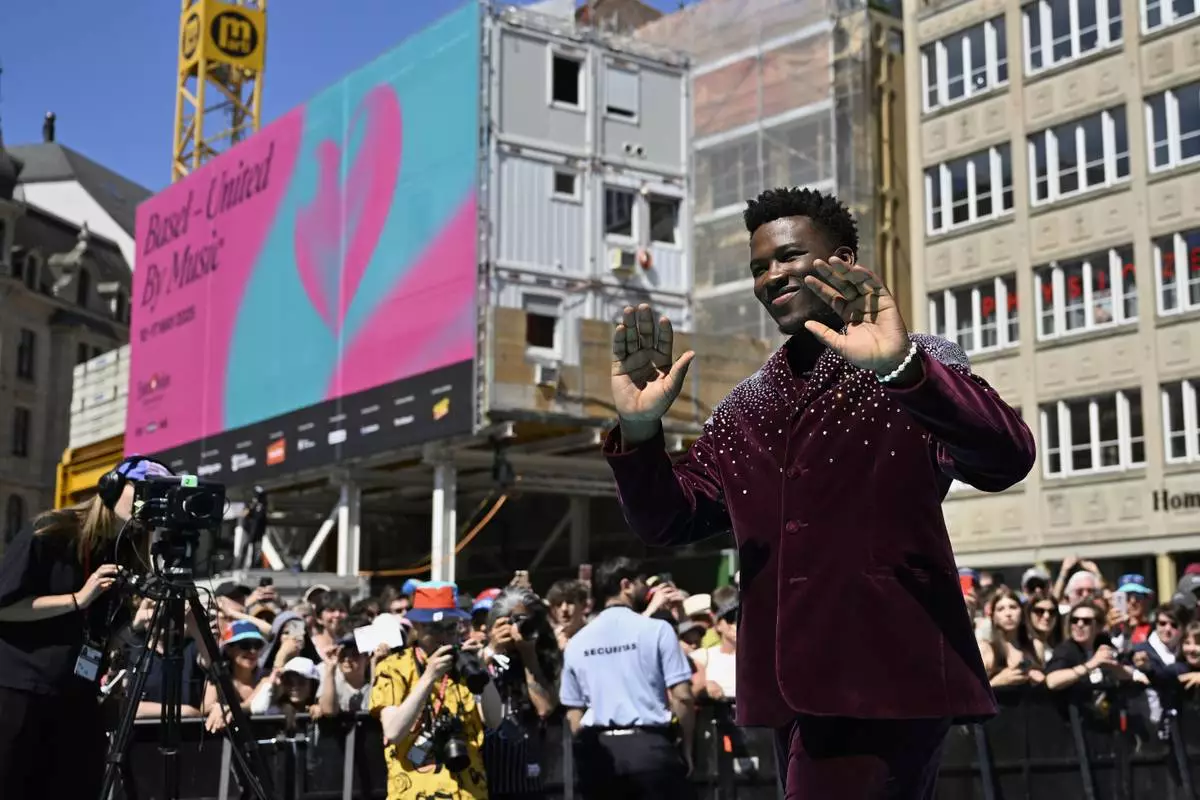
Netherlands' Claude poses for a photo, during the opening ceremony of the 69th Eurovision Song Contest, in Basel, Switzerland, Sunday, May 11, 2025. (Peter Schneider/Keystone via AP)
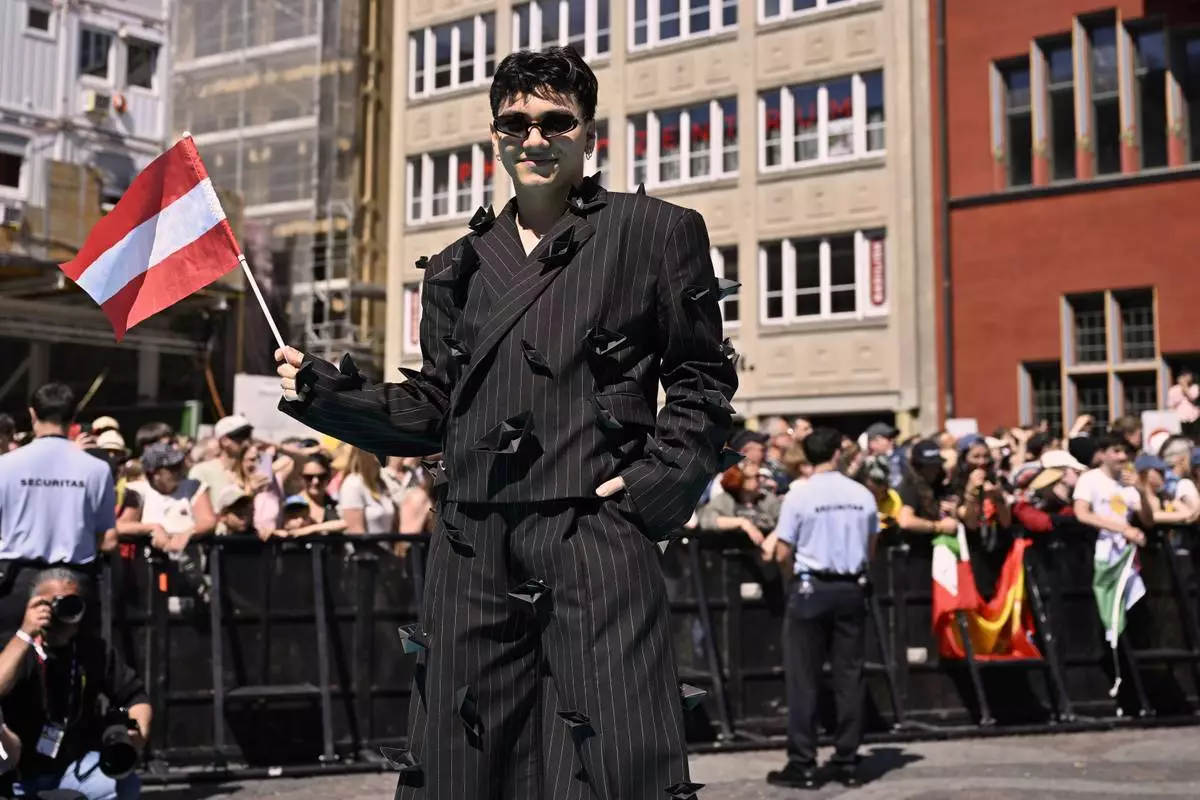
Austria's JJ poses for a photo, during the opening ceremony of the 69th Eurovision Song Contest, in Basel, Switzerland, Sunday, May 11, 2025. (Peter Schneider/Keystone via AP)
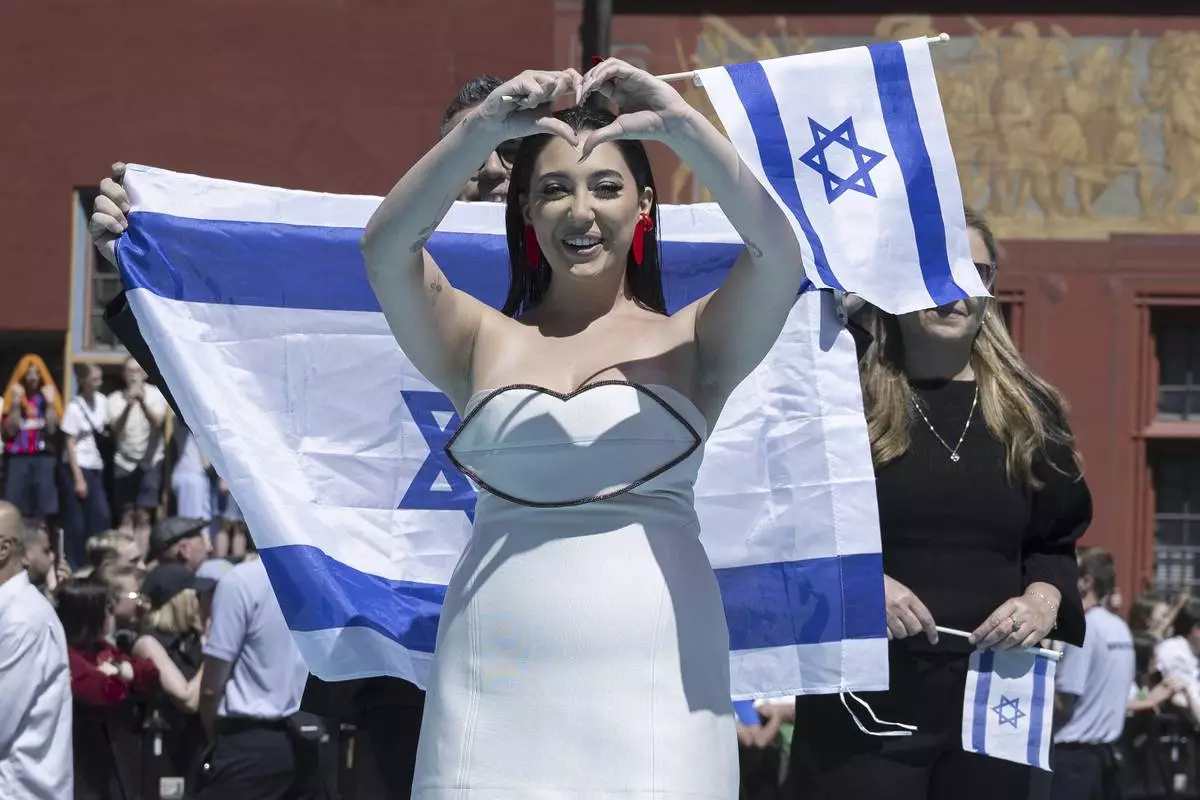
Israel's Yuval Raphael poses for a photo, during the opening ceremony of the 69th Eurovision Song Contest, in Basel, Switzerland, Sunday, May 11, 2025. (Peter Schneider/Keystone via AP)
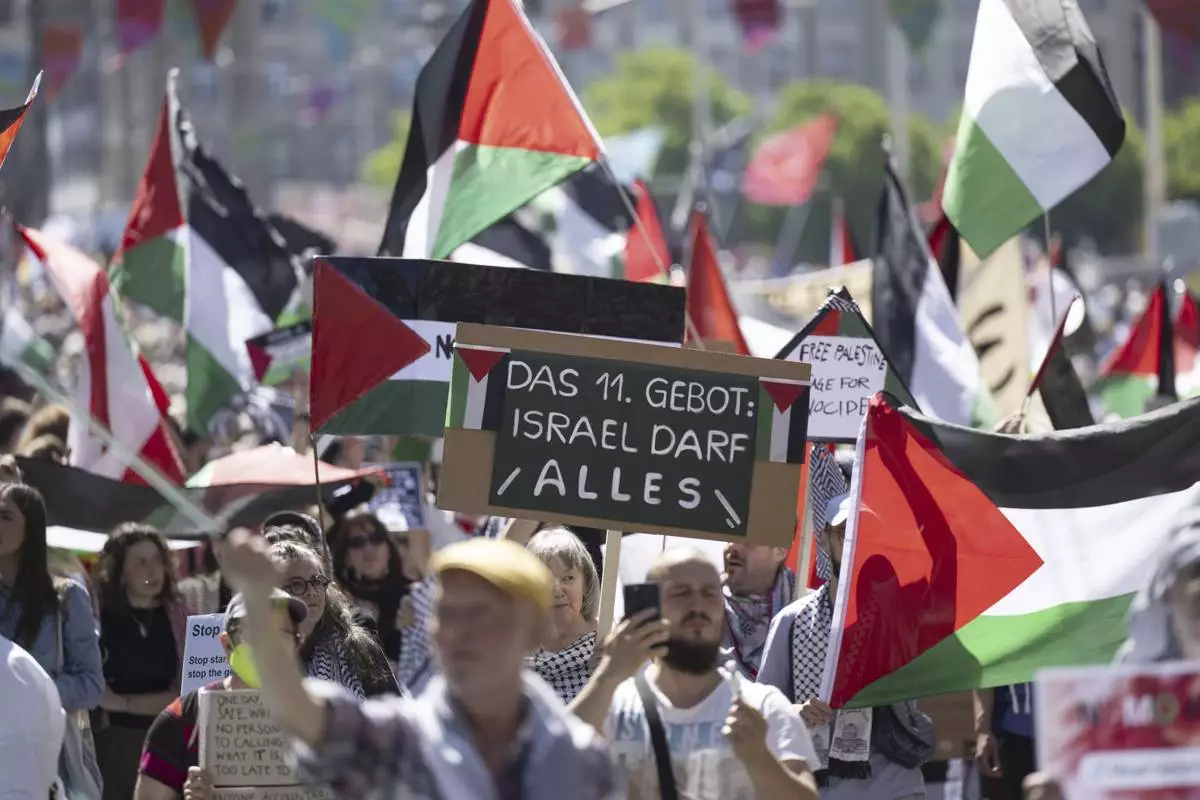
Pro Palestinian protesters demonstrate, during the opening ceremony of the 69th Eurovision Song Contest, in Basel, Switzerland, Sunday, May 11, 2025. Sign read, '11th Commandment: Israel is allowed to do everything.' (Georgios Kefalas/Keystone via AP)
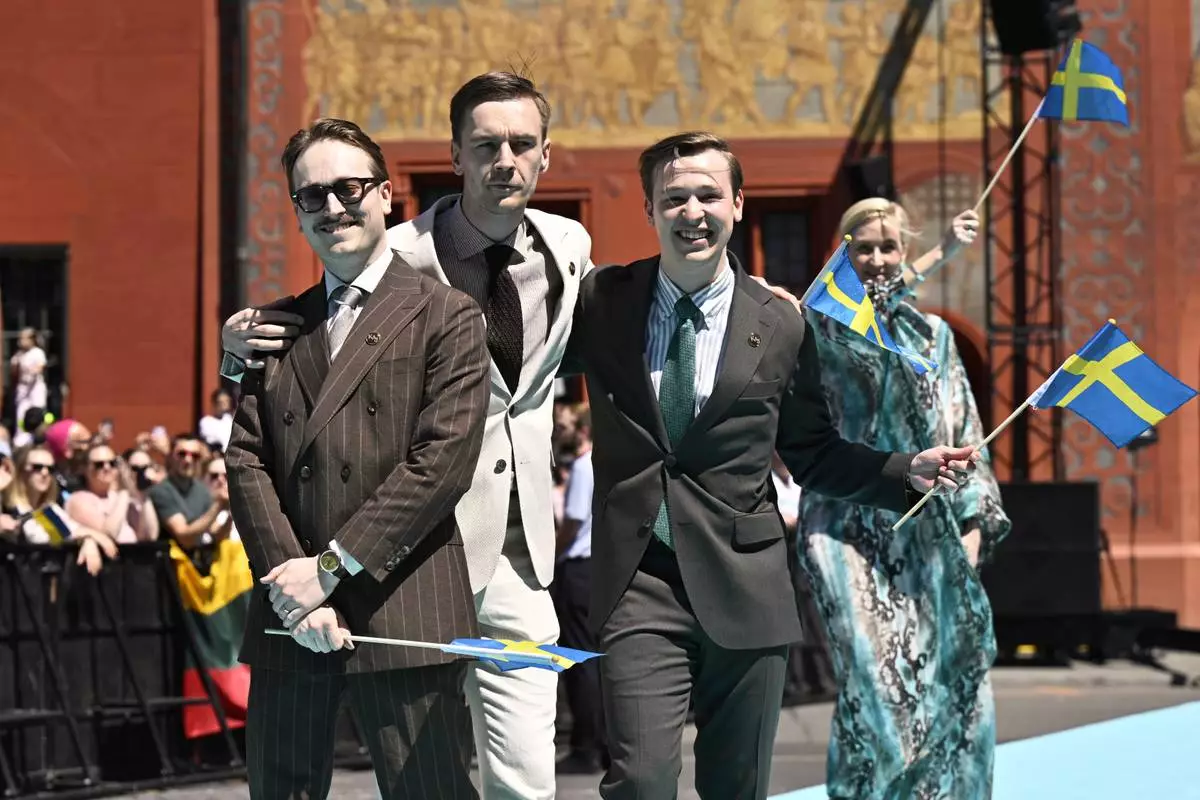
Sweden's KAJ pose for a photo, during the opening ceremony of the 69th Eurovision Song Contest, in Basel, Switzerland, Sunday, May 11, 2025. (Peter Schneider/Keystone via AP)
CRANS-MONTANA, Switzerland (AP) — Dozens of people are presumed dead and about 100 injured, most of them seriously, following a fire at a Swiss Alps bar during a New Year’s celebration, police said Thursday.
“Several tens of people” were killed at the bar, Le Constellation, Valais Canton police commander Frédéric Gisler said.
Work is underway to identify the victims and inform their families but “that will take time and for the time being it is premature to give you a more precise figure," Gisler said.
Beatrice Pilloud, attorney general of the Valais Canton, said it was too early to determine the cause of the fire. Experts have not yet been able to go inside the wreckage.
“At no moment is there a question of any kind of attack,” Pilloud said.
Officials called the blaze an “embrasement généralisé,” a firefighting term describing how a blaze can trigger the release of combustible gases that can then ignite violently and cause what English-speaking firefighters would call a flashover or a backdraft.
“This evening should have been a moment of celebration and coming together, but it turned into a nightmare,” said Mathias Rénard, head of the regional government.
The injured were so numerous that the intensive care unit and operating theater at the regional hospital quickly hit full capacity, Rénard said.
Helicopters and ambulances rushed to the scene to assist victims, including some from different countries, officials said.
“We are devastated,” Frédéric Gisler, commander of the Valais Cantonal police, said during a news conference.
The injured were so numerous that the intensive care unit and operating theater at the regional hospital quickly hit full capacity, according to regional councilor Mathias Rénard.
The municipality had banned New Year’s Eve fireworks due to lack of rainfall in the past month, according to its website.
In a region busy with tourists skiing on the slopes, the authorities have called on the local population to show caution in the coming days to avoid any accidents that could require medical resources that are already overwhelmed.
The community is in the heart of the Swiss Alps, just 40 kilometers (25 miles) north of the Matterhorn, one of the most famous Alpine peaks, and 130 kilometers (81 miles) south of Zurich.
The highest point of Crans-Montana, with a population of 10,000 residents, sits at an elevation of nearly 3,000 meters (1.86 miles), according to the municipality’s website, which says officials are seeking to move away from a tourist culture and attract high-tech research and development.
The municipality was formed only nine years ago, on Jan. 1, 2017, when multiple towns merged. It extends over 590 hectares (2.3 square miles) from the Rhône Valley to the Plaine Morte glacier.
Crans-Montana is one of the top race venues on the World Cup circuit in Alpine skiing and will host the next world championships over two weeks in February 2027.
In four weeks’ time, the resort will host the best men’s and women’s downhill racers for their last events before going to the Milan Cortina Olympics, which open Feb. 6.
Crans-Montana also is a premium venue in international golf. The Crans-sur-Sierre club stages the European Masters each August on a picturesque course with stunning mountains views.
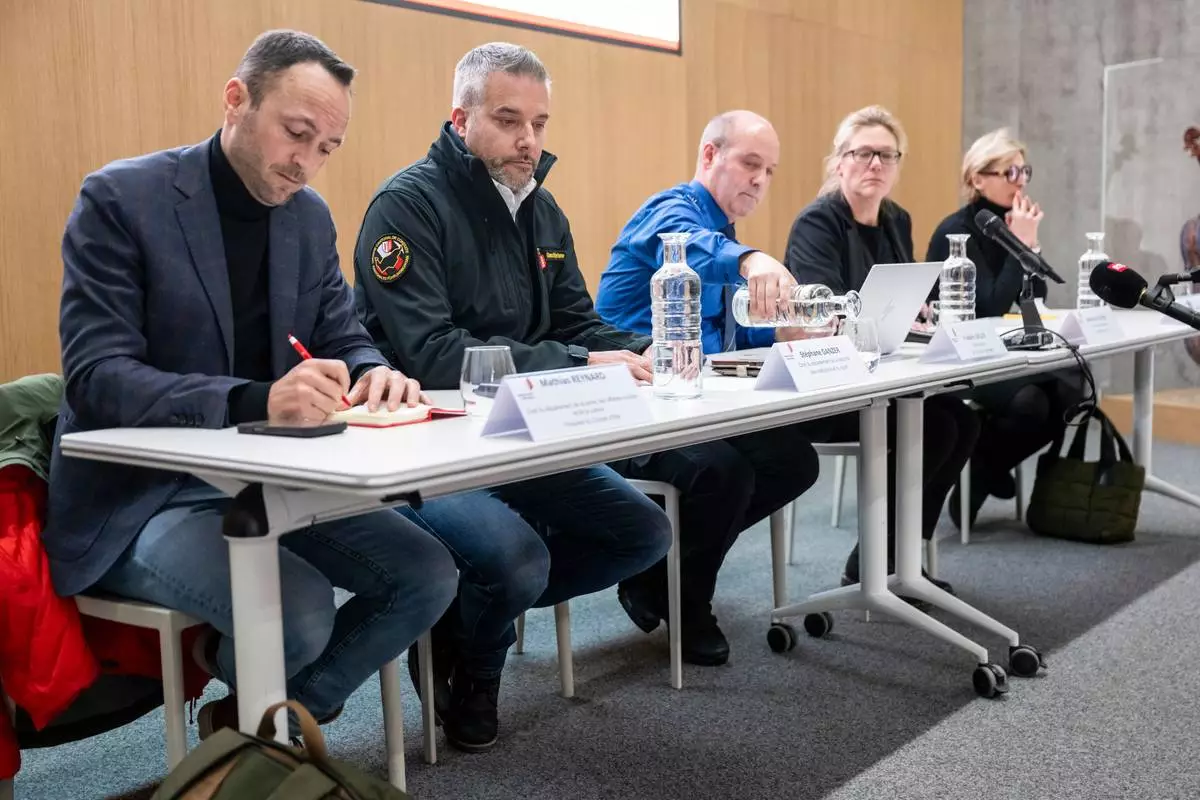
From left, Mathias Reynard, State Councillor and president of the Council of State of the Canton of Valais, Stephane Ganzer, State Councillor and head of the Department of Security, Institutions and Sport of the Canton of Valais, Frederic Gisler, Commander of the Valais Cantonal Police, Beatrice Pilloud, Attorney General of the Canton of Valais and Nicole Bonvin-Clivaz, Vice-President of the Municipal Council of Crans-Montana during a press conference in Lens, following a fire that broke out at the Le Constellation bar and lounge leaving people dead and injured, during New Year’s celebration, in Crans-Montana, Swiss Alps, Switzerland, Thursday, Jan. 1, 2026. (Alessandro della Valle/Keystone via AP)
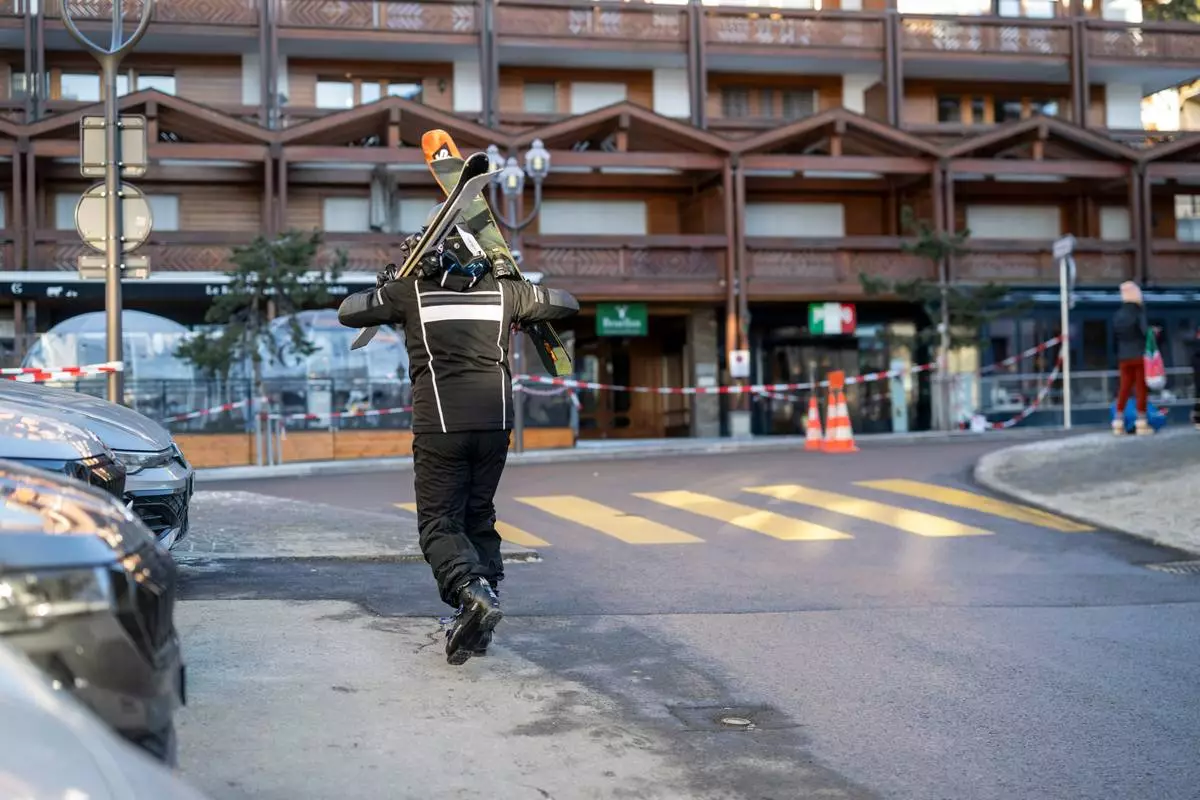
A skier walks in the area where a fire broke out at the Le Constellation bar and lounge leaving people dead and injured, during New Year’s celebration, in Crans-Montana, Swiss Alps, Switzerland, Thursday, Jan. 1, 2026. (Alessandro della Valle/Keystone via AP)
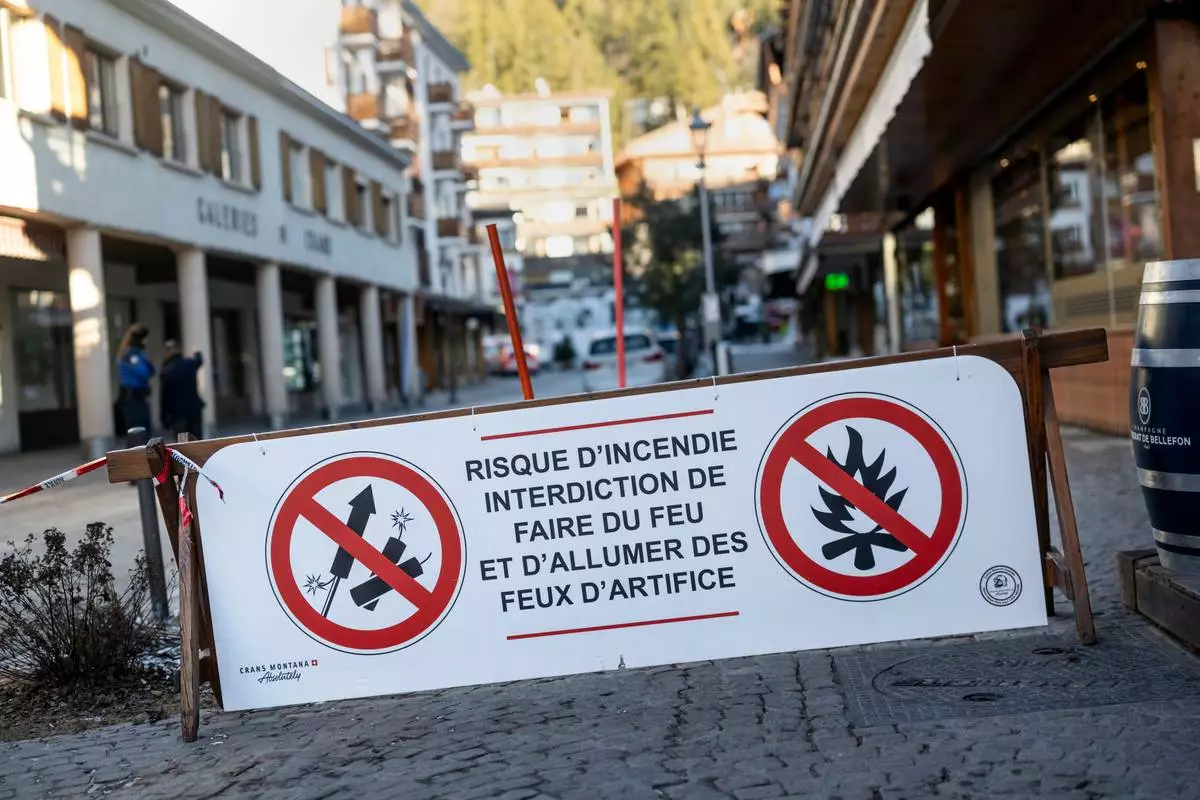
A banner stating that fireworks are prohibited due to the risk of fire is pictured near the area where a fire broke out at the Le Constellation bar and lounge leaving people dead and injured, during New Year’s celebration, in Crans-Montana, Swiss Alps, Switzerland, Thursday, Jan. 1, 2026. (Alessandro della Valle/Keystone via AP)
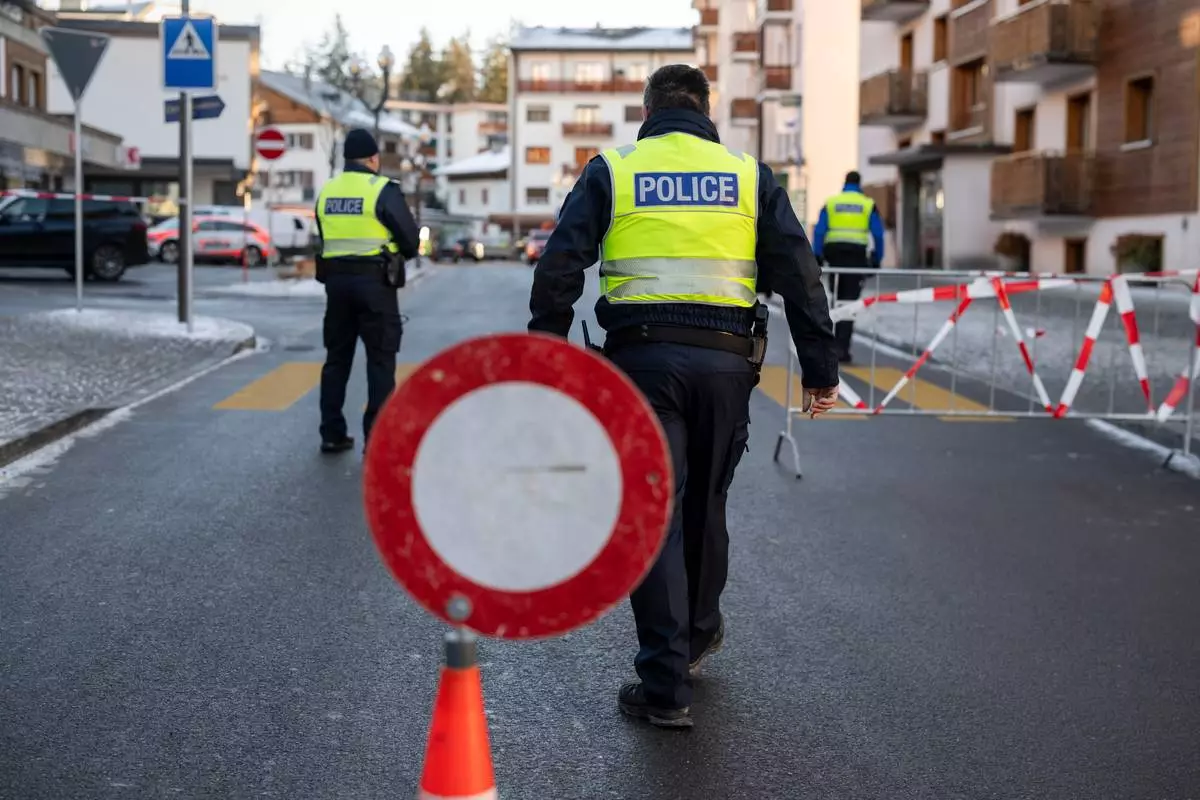
Police officers inspect the area where a fire broke out at the Le Constellation bar and lounge leaving people dead and injured, during New Year’s celebration, in Crans-Montana, Swiss Alps, Switzerland, Thursday, Jan. 1, 2026. (Alessandro della Valle/Keystone via AP)
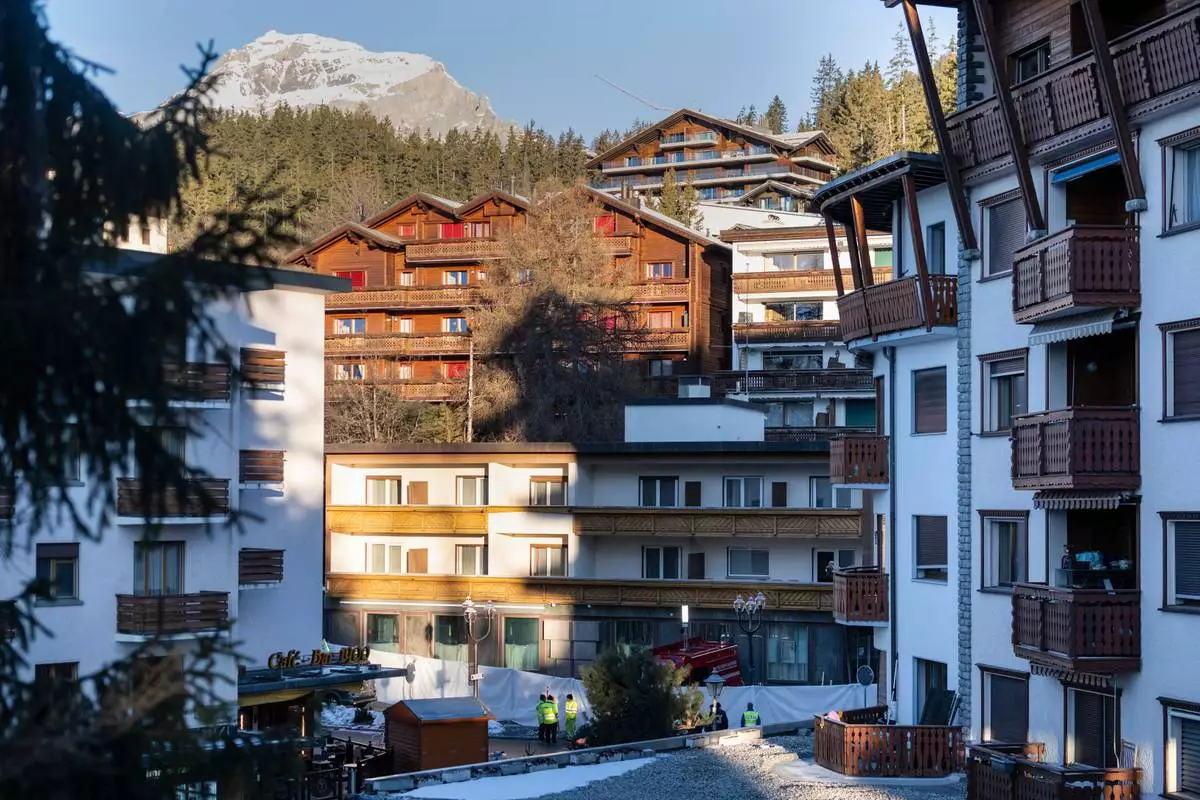
Police officers inspect the area where a fire broke out at the Le Constellation bar and lounge leaving people dead and injured, during New Year’s celebration, in Crans-Montana, Swiss Alps, Switzerland, Thursday, Jan. 1, 2026. (Alessandro della Valle/Keystone via AP)
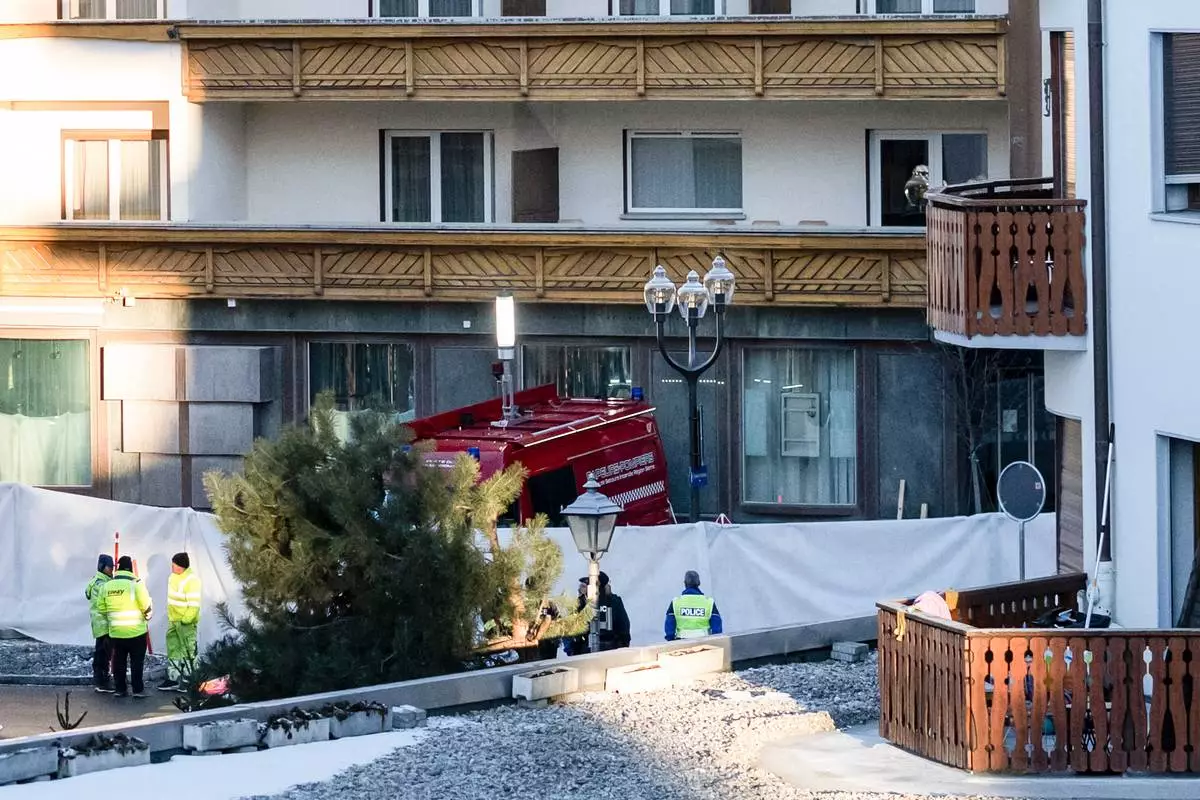
Police officers inspect the area where a fire broke out at the Le Constellation bar and lounge leaving people dead and injured, during New Year’s celebration, in Crans-Montana, Swiss Alps, Switzerland, Thursday, Jan. 1, 2026. (Alessandro della Valle/Keystone via AP)
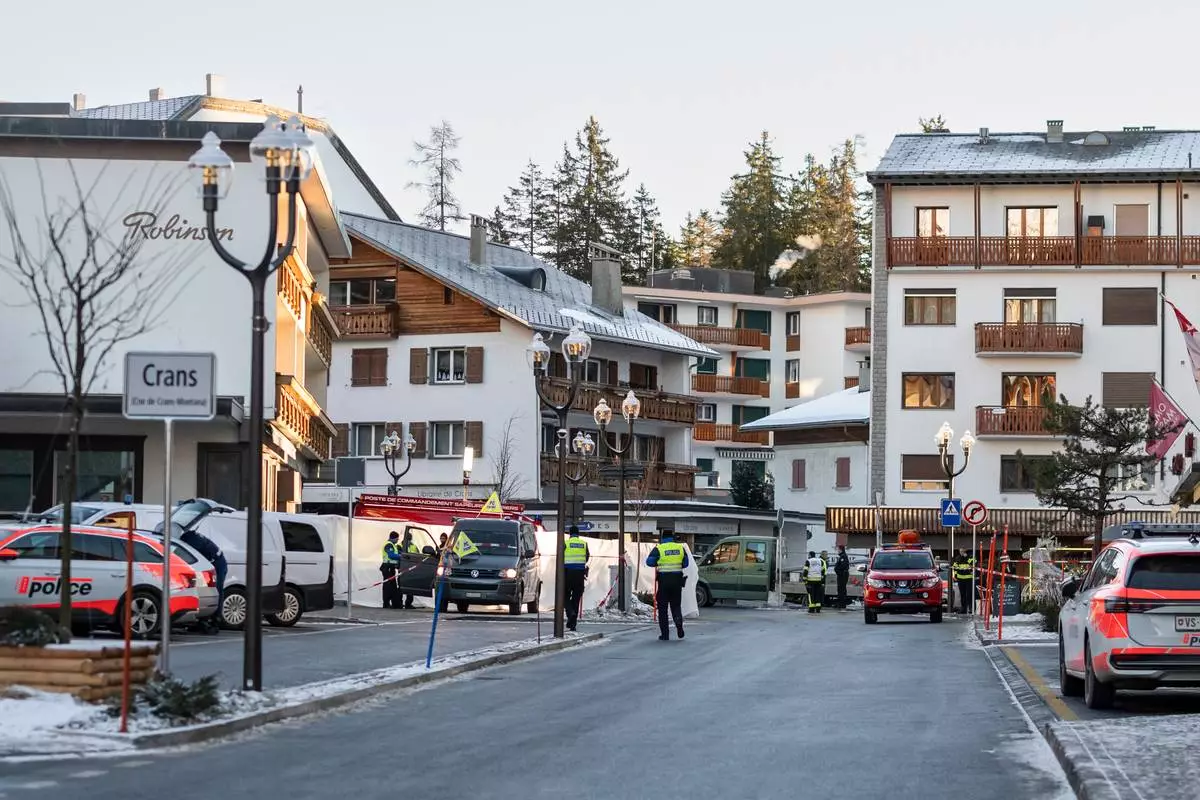
Police officers inspect the area where a fire broke out at the Le Constellation bar and lounge leaving people dead and injured, during New Year’s celebration, in Crans-Montana, Swiss Alps, Switzerland, Thursday, Jan. 1, 2026. (Alessandro della Valle/Keystone via AP)












